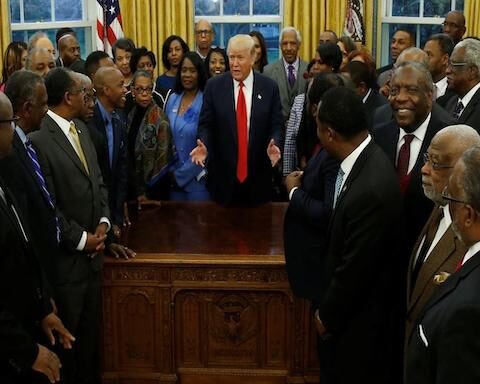By Alexis Simendinger
While the Democratic Party searches for its black box buried under an election crash site, Senate and House Republicans are celebrating with President-elect Trump and plotting rapid action to deliver on a historically conservative agenda.
Voters handed them a mandate, Trump says, and his party intends to deliver.
On Wednesday, President Biden will host Trump at the White House as part of the handoff between two men who have scant respect for one another. Each has run for president three times. One, who will be 82 in nine days, is exiting a lifetime in politics on Jan. 20 and could see his legacy initiatives reversed in brisk succession next year by Republicans who have the power.
Trump, 78, returns to the White House as a lame duck bolstered by GOP lawmakers who want to use their majorities to bury Democrats and their progressive ideas.
Speaker Mike Johnson (R-La.) has been working with Senate Republicans and Trump for months on bills they can enact with speed to show supporters they mean business. The list includes a basket of new and extended tax cuts and repeal of climate and energy provisions in the Democrat-passed Inflation Reduction Act.
The Senate will be under GOP control in January, and while there are still 18 House races to be called, Republicans feel confident they have enlarged their narrow House control.
“When we retake control of government, we’re going to roll back the Green New Deal regulations and put America back in a place of American energy dominance,” Johnson promised.
Other priorities the GOP has in mind next year: Funding for border security, including Trump’s unfinished wall, and conservative changes to schools and universities. “We can reform our education system by maximizing school choice for parents and holding woke university administrators accountable,” according to the Speaker.
Trump campaigned to stop migrants from entering the U.S. and deport an estimated 11 million undocumented immigrants who are living and working in the country. The details of how the administration would round up and send millions of migrants to other nations remains unclear, especially if they have children born in the U.S.
“Trump will unleash the vast arsenal of federal powers to implement the most spectacular migration crackdown,” Trump adviser Stephen Miller said a year ago. Former senior Trump officials helped write Project 2025, a detailed plan to overhaul federal agencies that includes more than 175 immigration actions. Trump as a candidate distanced himself from its 900 pages.
On Sunday, Trump announced his incoming deportation “border czar,” Tom Homan, who told Fox News “Sunday Morning Futures,” “It’s going to be a well-targeted, planned operation conducted by the men of [Immigration and Customs Enforcement]. The men and women of ICE do this daily. They’re good at it,” adding, “When we go out there, we’re going to know who we’re looking for. We most likely know where they’re going to be, and it’s going to be done in a humane manner.”
The Hill’s Alexander Bolton points to a key player who has broad power under budget reconciliation rules to determine what GOP lawmakers can pass quickly with a simple majority vote. Senate Parliamentarian Elizabeth McDonough has a record of ruling against adding immigration changes to budget reconciliation. That could trigger calls that she be replaced.
This week, Republican senators will vote privately for a colleague to lead their conference next year. The leadership contest has turned into a sharp-elbows race.
The endorsements have ricocheted into public view among candidates Sens. John Thune (S.D.), John Cornyn (Texas) and Rick Scott (Florida). The question is whether Trump will stay out of the leadership race, as Thune has recommended.
Scott, who touts his close ties with the president-elect, is endorsed by fellow Florida Sen. Marco Rubio, Sens. Bill Hagerty (Tenn.), Ron Johnson (Wis.), Rand Paul (Ky.) and billionaire Elon Musk, a Trump ally(Fox News).
As GOP policy priorities come into sharper focus for the new year, attention turns to the anticipated chairs of key Senate committees who will serve as sherpas for Trump’s long list of campaign promises.
To enact tax code changes, Idaho Republican Mike Crapo is expected to take the lead as anticipated chair of theSenate Finance Committee next year(Law360 and Punchbowl News). GOP health policy initiatives will be a shared load in the Senate as Trump and conservatives take aim at Medicare and Medicaid and vow to repeal the Affordable Care Act, a popular law among voters after 14 years. The top Republican who may chair the Health, Education, Labor and Pension Committee is Sen. Bill Cassidy of Louisiana, a physician.
Cornyn is now the ranking Republican on the powerful Senate Judiciary Subcommittee on Immigration, Citizenship and Border Security and may take the reins as a border state leader next year.
▪ The Hill: Trump’s GOP skeptics in Congress face a lonely path.
▪ The Hill: Sen. JD Vance of Ohio will give up his seat and be replaced when he’s sworn in as vice president in January. Ohio Gov. Mike DeWine (R) will fill that seat by appointment and the jockeying has begun. Jane Timken, the former Ohio GOP chair, is widely believed to be among leading early contenders.
BOB’S SMART TAKE
Agonized Democrats are going to have some uncomfortable moments over the next couple of months.
Biden will welcome Trump this week at the White House. On Jan. 6, Harris will formally preside as Congress counts the 2024 electoral votes. And then, as former President Obama, former President Clinton, Biden and Harris look on, Trump will be inaugurated as the nation’s 47th president. That is going to be Larry David-level awkwardness as Democrats struggle to comprehend what happened last week.
The worst part for Democrats will come next, as Trump and his trusted circle of advisers, including Donald Trump Jr., Musk and Miller, craft policies on the economy, energy and immigration over the next four years. It’s a dark time for Democrats, but just waiting for 2026 won’t cut it. Democrats need to change. They have a lot of work to do.
▪ After Trump’s win, nearly 200 nations meeting at an annual United Nations climate summit this week must now consider how to avoid catastrophic climate change without help from the U.S.
▪ Genetic brushstrokes are slowly painting a truer picture for DNA-sleuthing scientists of how people lived and died in Pompeii in 79 AD.
▪ Strokes last year were the fourth leading cause of death in the U.S. — and the majority could have been prevented. Here are updated federal guidelines for patients and doctors. Spoiler alert: A new class of weight loss drugs can be a big help.
THE DEMOCRATS’ SHELLACKING at the polls this week has triggered a feisty battle between the ideological wings of the party about what went wrong — and whether liberals or centrists bear the blame. Some liberals say the party didn’t tack far enough to the left to animate the base. Many centrists say it tacked too far to the left and scared away moderate voters in key battleground states. And Democratic leaders are now faced with the difficulty of working to ease the tensions between the feuding factions to form a unified front against Trump.
“It will be a big challenge,” said Rep. John Larson (D-Conn.), former chair of the House Democratic Caucus.
In an attempt to explain Harris’s defeat, Democratic lawmakers (including some of those pictured above) joined analysts in blaming Biden’s lengthy decision making before withdrawing as nominee. Inside the party, pundits point to misinformation, the Gaza war, a toxic Democratic brand and the party’s approach to transgender issues as challenges with voters. The debate is hardly new. Democrats have repeatedly clashed over the party’s strategy after tough election cycles, and the battle lines are the same now as then, pitting liberals against moderates.




